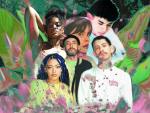The Mess is a new column from journalist Richard Villegas, who has been reporting on new, exciting sounds flourishing in the Latin American underground for nearly a decade. As the host of the Songmess Podcast, his travels have intersected with fresh sounds, scene legends, ancestral traditions, and the socio-political contexts that influence your favorite artists. The Mess is about new trends and problematic faves whilst asking hard questions and shaking the table.
We’re going there. We’re talking about it. Even if things get a little messy.
It’s been two months since Pride festivities wrapped, and my knees still haven’t fully recovered. I unlocked a new level of gay this year by marching in Mexico City and Bogotá over consecutive weekends and soaking up the cocktail of campy exuberance and burning dissidence that has engulfed the rainbow. In both cities and for some time now, I perceived something different in the air. No, not poppers, but change. Pride is evolving. Language is transforming, and so are our fights. But amidst rampant tribalist in-fighting, vapid social media antics, and a glaring lack of self-critique, it’s also a feeling that our community has lost sight of why we march every June.
We’re fractured. I don’t mean to be trite, but in terms of priorities, I’m more concerned with access to affordable healthcare and that my trans friends can pee in peace than whether or not Troye Sivan is casting plus-size dancers in his new music video. The same goes for moralists who argue Pride is a protest and not a party, when in a society that would rather see us eradicated than thriving, collective joy is the biggest middle finger we can raise. They wear self-important T-shirts emblazoned with slogans like “The first Pride was a riot,” while oblivious of how struggle merch renders those anti-capitalist intentions moot.

Also, shout out to the folks who oppose nudity and kink at Pride, when throughout history, the sluttiest of us have quite literally worn our identities on our leather sleeves — or lack thereof — while countless others are still forced to hide. We don’t march for respectability.
Yes, we should be more alarmed by how much influence major brands exert over Pride events. On the flip side, isn’t it preposterous to mythologize the dance floor as a safe space of mutual understanding and acceptance while condemning the occupation of public spaces with unapologetic, glittering revelry? Don’t answer that. Just watch the following clip of Brazilian Black trans congresswoman Erika Hilton addressing São Paulo’s two million-strong Pride march about the need for such displays of visibility and strength.
Music and nightlife are excellent lenses for examining our community’s fragmenting. For example: Have you ever noticed LGBTQ+ artists are rarely played at gay bars? Back in 2019, Brooklyn-based culture and nightlife writer Eric Shorey (aka DJ Accident Report) asked just that, surveying fellow DJs, promoters, and drag artists from across the U.S. to hone in on why we’re sonically underrepresented at our own parties. To a certain degree, DJs and promoters have a taste-making responsibility. Still, as cavorting mortals, we also share the burden of demanding our people be heard on our dance floors.

Latin America is no different. No night out at the gay club is complete without Gloria Trevi, Shakira, Thalia, Karol G, or Selena. You might get Juan Gabriel or some conspicuously queer-coded classics from Daniela Romo and Ana Gabriel at a climactic point in the evening, but why aren’t current LGBTQ+ pop stars being played? I know I’ve danced to Javiera Mena and Alex Anwandter once in a blue moon. Esteman, Mula, and Brazil’s extraordinarily talented trans women got the bangers on lock. At least during perreo sets Tokischa, Villano Antillano, and newcomer La Cruz are becoming mainstays.
In the underground, LGBTQ+ artists face a more even playing field. NAAFI co-founder Mexican Jihaad has centered sex and hedonism in Mexico City nightlife to break with the family-friendly image that’s become uplifting fodder on straight folks’ favorite TV shows. (Hi Ru, good luck at the Emmys!) In Buenos Aires, DJ/producer Tayhana questioned the limited narrative of equality, saying in a recent interview, “We embraced each other’s differences and how that led us all to the same dance floor.”
It’s also worrisome how LGBTQ+ revelers are being crowded out of our own spaces. This is a complaint of Mexico City nightclubs La Purísima, Soberbia, and Rico Club, which are now tourist traps for heterosexual adventurists who often break into fights and disrespect drag performers. Building spaces for us and by us is a recurring storyline in Brazil, Costa Rica, Dominican Republic, and Ecuador.

Niche circles aren’t exempt from frivolous consumption and performativity, either. Last year at Festival Ceremonia, I watched many fans walk away disappointed after Arca delivered one of her signature glitch and noise-filled sets, where she usually avoids her own catalog and instead warps merengue and reggaeton classics in real-time. That good ‘ol licuadora music.
Actual fans know Arca would rather provoke than please. And actual fans would not have heckled trans-disciplinary arts collective La Pocha Nostra during their pre-show performance just because they wanted to shake ass to “Prada” and “Rakata,” even if the molly was already hitting. But when blindsided by glossy Instagram aesthetics and commodified representation, you’re not engaging with the nuance of these artists. Sorry to be a wet blanket, but Arca has worked too fucking hard to be reduced to a “yasss queen, slay hunty, fan-crack” soundbite.
To be clear: I’m critical of my community because I love and respect my community. But please remember we’re in this fight together instead of constantly sabotaging each other. I’m not even especially concerned with being “right,” but I think my peers have become too afraid of the rabid wildebeest that is the Internet to engage publicly with these conversations.

Here at Remezcla, we spent all of June highlighting LGBTQ+ joy. And I am certainly not suggesting we pivot to tragedy — even if seven years later, the Pulse Nightclub shooting still stings as it did the morning the news broke, and our community endures new attacks and losses with growing frequency. A playlist won’t save us, and neither will my ranting. But the rainbow’s on fire, and it’s up to you to put that on a T-shirt or go out and march about it.





